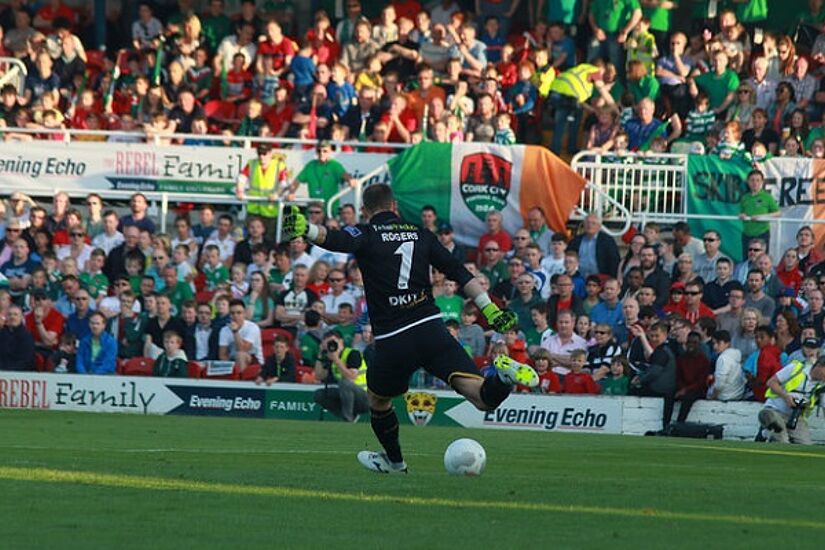Gary Rogers: Cork and Dundalk have dragged each other along and it's up to the others to catch up

Credit: Gerard Buckley (ETPhotos)
One of the League of Ireland’s most experienced goalkeepers, Gary Rogers, has won every domestic honour and even earned a call-up to Martin O’Neill’s Irish squad. However, as he tells ExtraTime.ie, Gary could easily have stayed playing Gaelic football, until fate intervened.
“At 17/18, I was on the Meath senior panel and signed with Shelbourne. With my local GAA club, I got sent off and was suspended for three months. There was no point training with Meath for three months without playing, so I continued with Shels. Otherwise, I came close to going the other way.”
The young netminder never made it onto Shelbourne’s first team, but gained invaluable experience on loan at St Francis during their 2000/01 First Division campaign: “Steve Williams was first-choice goalkeeper and Fred Davis the goalkeeping coach. I never received specialised coaching before, as I played GAA underage and soccer wasn’t my priority. Mick Neville rang and said that St Francis have come in, you’ll be playing at the weekend and I said yes immediately. I wanted to play football and see where I was at. If I hadn’t gone to St Francis, I might never have become a League of Ireland goalkeeper. There’s no point in being Shels’ third choice and expecting to go straight into the first team. They were double champions and if they wanted a new ’keeper, they’d sign one. Off the back of St Francis, I signed for Drogheda the following year and we won the First Division.”
Rogers remained the Drogs’ number one for a number of years in the Premier Division, but lost his place in 2005 to Dan Connor and was on the bench for that season’s FAI Cup final victory: “Myself and Dan got on grand and worked well together. He got injured that year and I played in four games, but then Paul Doolin put Dan directly back into the team. I spoke to Paul and knew I was never getting in the team again. He wanted to play Dan and that was that. Playing football is what it’s all about and it was frustrating that season.”
Joining Dermot Keely’s Dublin City at the end of the year, the club pulled out of the League of Ireland six months into Gary’s contract: “We all met in a hotel and it was a bolt out of the blue. We were told that the club had gone and we were free to sign for another one. I went to my local GAA club’s next game with my gear … There was nobody to tell me otherwise. I played the rest of the championship and signed for Bray until the season’s end.”
In early 2007, the Meath native penned a deal with newly-promoted Galway United, avoiding relegation during both of his seasons with the Tribesmen: “The first year we stayed up was great for the club. The second was more difficult, when Tony Cousins got sacked. There was a period when we had no manager, then Jeff Kenna came in. We went on an unbelievable run in the last 12 games, probably picking up more points than anybody and stayed up in the final match, against UCD. People always rate leagues and cups, but when your back’s against the wall, there’s a possibility of losing your job and you have to produce, in order to keep the club up and afloat, was incredible.”
Following Kenna to St Patrick’s Athletic, Rogers’ return to Leinster saw impressive performances in Europe, but no silverware on the domestic front: “Great players there, but a transitional squad. It’s difficult to pinpoint … Playing awful in the league, but overachieving in Europe.”
Heading west again, in late 2011, Gary and Sligo Rovers captured the 2013 FAI Cup, the following year’s Setanta Sports Cup, but the 2012 Premier Division title is highlighted for particular attention: “Me travelling to Sligo was hard on my wife, but I wanted to go there because I believed they were going to top the table. I was turning 30 and thinking would I ever win the Premier Division. I won the First Division at 20 and thought I’d be going for leagues every year, but it doesn’t happen. To win the big one with Sligo ten years later was special.”
The trophies didn’t end there. Rogers’ switch to Dundalk subsequent to the 2014 season, preceded the 2015 double, regaining the title and this year’s EA Sports Cup. In addition to winner’s medals, the in-form goalkeeper was also called up to the Republic of Ireland squad.
“It came from going in training and it went well. Dundalk were doing wonders in the Champions League, but I was still surprised. To be brought in and involved is of huge significance to me.”
Of Dundalk’s aforementioned accomplishments and now with Cork City’s ascendancy, Gary expresses why both clubs are head and shoulders above the rest: “After Dundalk won three titles in succession, they’ve raised the bar and Cork have been there or thereabouts. Now they’ve won the league after taking last year’s FAI Cup. Cork and Dundalk have dragged each other along and it’s up to others to catch up. Players have made sacrifices on and off the park, to win trophies and push each other to be better. I think this will continue over the next few seasons.”
At 36, Rogers insists that retirement isn’t on the agenda, but when that day comes?
“In school, I didn’t know what I wanted … I’m nearly in the same situation now. I did a sports management degree in March, which I’ve been working towards for the last four years and have that in place, when I do retire. As a League of Ireland player, everybody’s aware that you can’t walk away and do nothing. You have to go into coaching or another field. It’s important to get education in place and sports management is an area I would be suited to in the future.”

